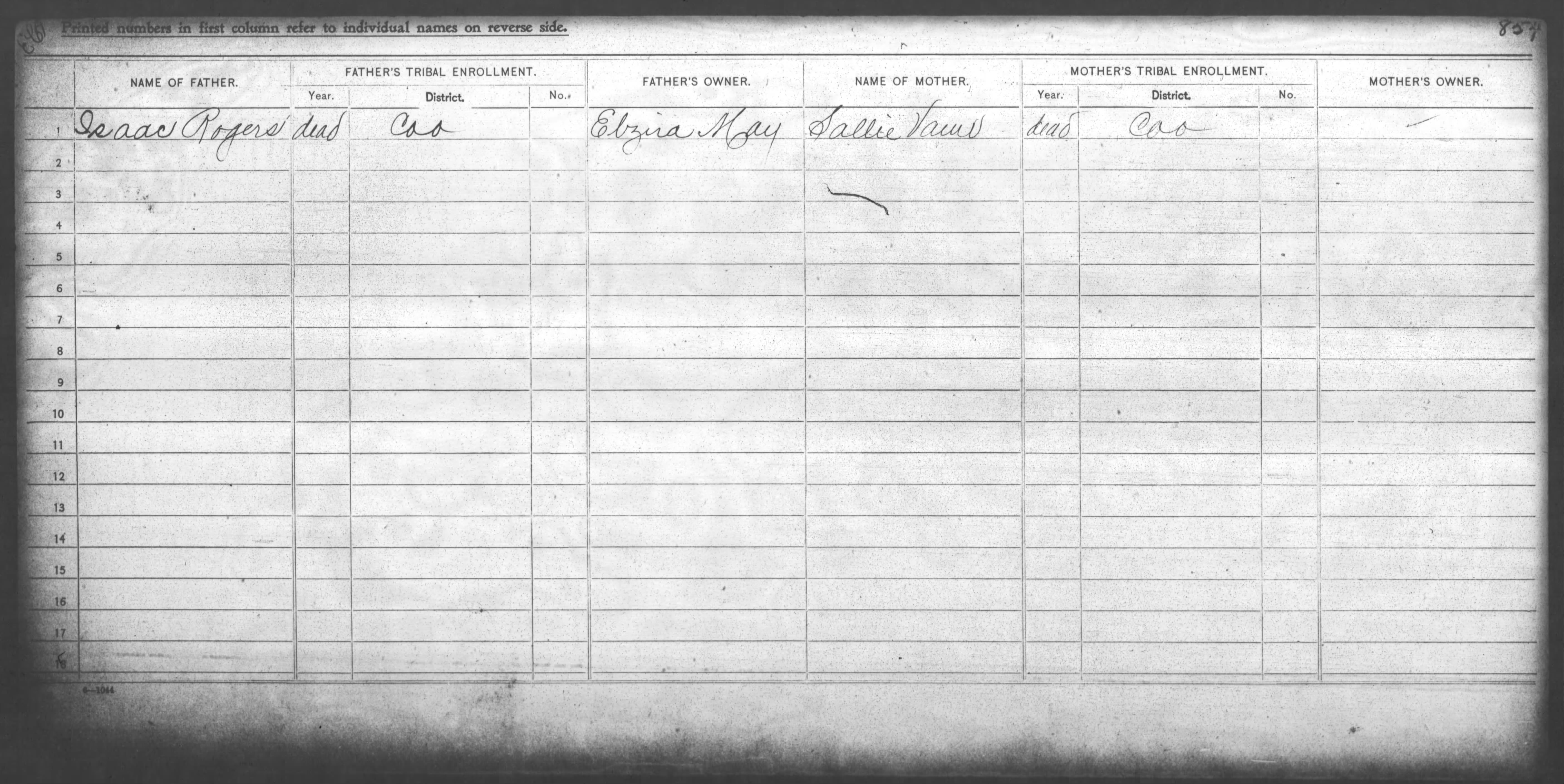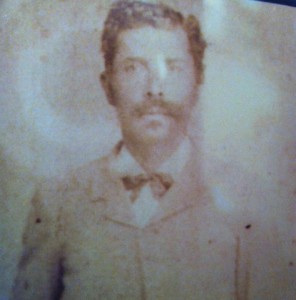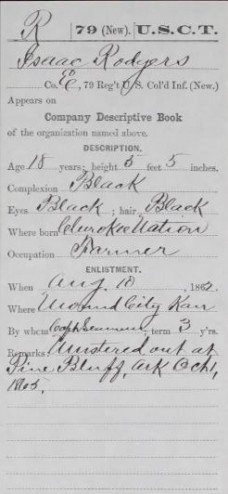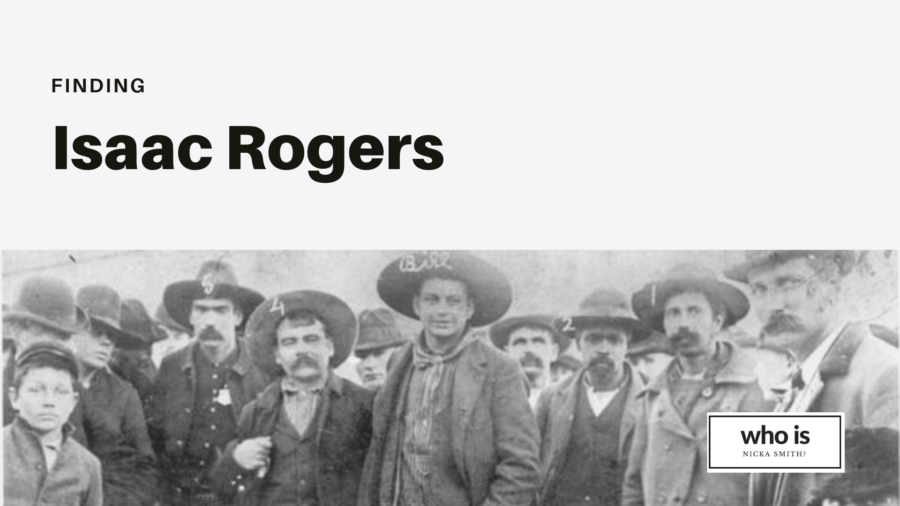Isaac Rogers was killed April 21, 1897 at a train depot in Fort Gibson, Indian Territory. As he stepped off of a train, Clarence Goldsby shot him once in the body and then three more times in the head. Goldbsy was never found. What a way to go out when going to pick up your check. 108 years later, Ike laid dead on what appears to be a mortician’s table. The book that the picture was in was yellowed, the cover missing. It was kept in a plastic bag. I remember my Dad saying that we were related to Ike, and I had questions like “Why on earth would somebody smoke him just for getting off the train? He doesn’t look African American at all – who were his parents?” There was no way I could ask these things. Dad had died three years prior. His parents, my grandparents, dead. My aunt, his sister, dead, as well as my only first cousin. I chose to call other relatives who told me that we were Cherokee and had deep roots in the nation. I also reached out to the genealogy community. The entire time I remained skeptical about it all.
Who was Isaac Rogers?

The community at Afrigeneas responded immediately. Angela Walton-Raji was the first to respond, and the lead she gave me was priceless. Ike had fought in the Civil War. Really?!? So, there I went and ordered his Civil War pension file. The file confirmed that he was the father of my great grandfather, Theodore Cooweescoowee “Cooey” Vann Rogers, Sr. OK, that makes Ike my 2x great grandfather, my grandmother Lois’ grandfather. Further research showed that he enlisted as part of the First Kansas Colored Infantry who, as per the Kansas Historical Society, were the first African American regiment to be recruited in the north, the first to see battle, and the first to die in the Civil War. take that 54th Massachusetts from the movie Glory. LOL
After a period of digging, and more conversations with relatives, I discovered that I was related to someone who was “famous.” Now, in the world of genealogy, researchers are always trying to prove they are related to someone, anyone, with a “name.” I’ve never been into this. I know having a “name” can be a little dangerous, but what I found still shocks me every time I read it.
Ike rogers was born about 1850 in the Indian Territory – or what is now northeast Oklahoma. He is always noted as being a relative of Clement Vann Rogers (father of humorist Will Rogers) – I haven’t been able to verify this – and family says his mother, Martha Richardson (aka Martha May, Martha Humphries), conceived him with a man who was either caucasian or caucasian and cherokee. He was enslaved by Alzirah (Elzira) Price and her husband Peter May. Alzirah was Cherokee. Wait, what?!?
After all the history I had read, all the classes I attended, no one had ever told me that the Cherokee owned slaves. As a matter of fact, I would later discover that other groups who are part of the Five Civilized Tribes (Cherokee, Choctaw, Chickasaw, Creek (Muscogee), and Seminole) owned slaves. Statistics have said that 10 percent of the people who were part of the Trail of Tears were slaves. OK. History book rewrite?!? To say that this angered me was an understatement. There was a possibility that some of my ancestors were part of such a horrible event and they were never mentioned…EVER? Bad business.


Once Ike mustered out of the military, he eventually had several children, try 8 (Grandpa Cooey was number 4 or 5) and married about four times. I have to admit, he’s a pretty nice looking man. And judging by the number of children and wives (two were sisters), the ladies back then felt likewise. LOL
Ike eventually became a U.S. Deputy Marshal who rode for the infamous Judge Isaac Parker, who was dubbed “the hanging judge.” Remember the book with Grandpa Ike dead in it? I discovered that it detailed page after page Judge Isaac’s exploits as he hung 83 men during his tenure. That’s A LOT of people to hang. The book was an early edition of Hell on the Border. Grandpa Ike eventually lost his commission as a marshal…stories vary as to why (we’ll talk more about that later), but Ike came back into prominence due to a single act.
Cherokee Bill (Crawford Goldsby) was an Indian Territory outlaw who was (in the words of my mom) “Going around killing up folks just ’cause.” LOL He became nearly impossible to catch until Grandpa Ike and others used the most time honored trick in the world – employ his affinity for women. The story is pretty long, you can read more about it here, but after birthday party, whiskey drinking, a slumber party, a fire poker beating, and a near escape on a wagon ride, Judge Isaac eventually got to hang Bill. Clarence Goldsby, Bill’s brother, was the one who smoked Grandpa Ike at the train depot as retribution for his brother’s hanging. Eventually, I would have a great aunt who was also named Clarence. To this day, I have NO idea why Grandpa Cooey named one of his daughters the same name as the man that killed his father. LOL
![Cherokee Bill [above center with left hand in his pocket], who killed for the pleasure of killing, and his captors, on his arrival in Fort Smith, Arkansas, to face the Hanging Judge. Readig left to right: Zeke Crittenden and Dick Crittenden, deputy marshals; Bill; Clint Scales; Ike Rogers and deputy marshal Bill Smith. Source: http://www.jcs-group.com/oldwest/outlaws/cherokee.html](https://www.whoisnickasmith.com/wp-content/uploads/2013/02/CherokeeBillCapture-600px.jpg)
For anyone, this would have been enough for an entry in the family file, but Grandpa Ike wasn’t through with me yet. Earlier in my search, in addition to finding out who my ancestors were, I was interested in registering as a citizen of the Cherokee Nation since other family members had been enrolled. Ha. If it was only that simple.

Many don’t know that the Cherokee sided with the Confederacy during the Civil War. Because they were a sovereign nation within the U.S., neither the Emancipation Proclamation nor the 13th Amendment freed their slaves. A treaty was required between them and the U.S. government to do that. Although the Treaty of 1866 between the Cherokee and theU.S. government said that “all freedmen who have been liberated by voluntary act of their former owners or by law, as well as all free colored persons who were in the country at the commencement of the rebellion, and are now residents therein, or who may return within six months, and their descendants, shall have all the rights of native Cherokees,” that treaty was only honored up until the late 1970s, early 1980s.
My mother gave me a letter that was addressed to one of my great aunts. It was postmarked in 1985. It said she had to re-enroll and apply noting an ancestor who was on the “by blood” Cherokee Dawes roll. The Dawes Roll is what is used to verify eligibility for citizenship in the Cherokee Nation. This roll has been hotly debated regarding it’s accuracy as adopted whites and those who did not have a degree of blood were listed with a degree of blood and many of African descent who had a degree of blood weren’t listed with one and were noted only as Freedmen. The by blood and Freedmen rolls were segregated. Court battles have been brewing for years over formerly disenrolling the descendants of the former slaves. In the space of about five to seven years, I couldn’t, then I could, and then I couldn’t apply. My ancestors had returned to the nation as required, my great grandfather and grand aunts and uncles were on the rolls and even received land. Why were me and my family being denied? I became apathetic about the whole scenario. It was way too messy.
I learned there were other rolls before this, including the Wallace Roll which documented Cherokee Freedmen. One day, I started peeking around at more documents and came across notations of Grandpa Ike advocating for Cherokee Freedmen rights. What?!? Yes! Apparently, Ike was pretty riled up about how the nation was treating it’s formerly enslaved. He wrote letters to the editor of the Indian Chieftain and even went to Washington, DC. to advocate. It appears as though some of his efforts lead to creation of the Wallace Roll.
Eventually, Grandpa Ike ended up in front testifying in front of a Senate subcommittee on May 20, 1885. *wig across the room* To say that he was bold is not enough.
He could have been killed for what he said, especially during the time at which he said it. He flat out said that the Freedmen weren’t being treated equally. The words I read made me think I was a punk for not pursuing my rights as a Freedmen descendant considering that my own ancestor was brave enough to do so when it was WAY more dangerous for him than it is for me. After slavery, the Civil War, serving as a deputy marshal, and just life in general, Grandpa Ike felt it was worth it to have rights as a Cherokee – he earned them. Why shouldn’t I?
So…what’s next?
When I read through the writings of historians, they nearly all speak horribly about Grandpa Ike. I won’t go on record to say he was a perfect person. On the other hand, I can only imagine the reasons why he was characterized so bad. Last time I checked, other people who spoke out against the majority are almost always were characterized negatively. It’s obvious I need to rewrite his story. Stay tuned 😉
Update: I became the first person in my family in 114 years to be granted citizenship in the Cherokee Nation in March 2019. Click here to read more about my journey to citizenship.
Here are some of the sources I used:
- U.S. Civil War pension file – national archives and records administration (nara)
- Dawes Application cards and packets – digitized on fold3.com
- Various newspapers such as the Indian Chieftain, Vinita, OK newspaper – digitized on Chronicling America – Library of Congress website and others through genealogybank.com
- Census Records – U.S. census (1900 – Indian Territory, 1910, 1920, 1930 in Oklahoma); state census in Kansas. All available via ancestry.com
- U.S. Congressional Serial Set

Great story Nicka! I really enjoyed the read and Ike was quite the looker..
Thanks Ms. Vicky! 🙂
note his descendants can join SUVCW or DUVCW
http://www.suvcw.org/member.htm
http://duvcw.org/index.php/eligibility
Union bios at be placed at Photos from the PASt
http://suvcw.org/photos.htm
Awesome! Thank you for the resource!
Hi Nicka,
I’ve only just found your blog and this entry about Ike Rogers. I’m currently undertaking a PhD in American History at Monash University, Australia, and my thesis is about the freedmen of Indian Territory who were also veterans of the Union Army. As I write this, it’s about 1.30 am on a cold wintery Melbourne morning, and I’ve been writing about Ike as a Deputy Marshal and his untimely end at the hands of Cherokee Bill’s brother. He was a remarkable man, and the more I dig into the history of Indian Territory and find more information about these men I wonder why they have been overlooked by historians. Their stories are just so full and rich.
Anyway, I just thought I’d drop in and say hi.
cheers 🙂
Hi Kathy!
Greetings from the USA. Thanks so much for your comment. I bet both me and Ike (posthumously) are both amazed and honored that your thesis is about the freedmen of the Indian Territory! lol
As you mentioned, this group is VERY OFTEN overlooked by historians. I think it’s because of the nature of their relation to the groups to which they were formerly enslaved. It was a fine line to walk when one would advocate for rights for their people, but yet they enslaved others and didn’t consider them a full person. It’s almost a contradiction – one marginalized group against another, you know?
As I continue to dig deep in research, I find out more and continue to teach those I present to or even talk to about the freedmen. I’ve been blessed to connect with some amazing folks who are also freedmen descendants. If you’re ever in the states, I’d love to meet you! At my recent old job, my office mate was from Melbourne and he’s a doctor. 🙂
Pingback: who is nicka smith? » The African Americans: Many Rivers to Cross – Episode Three – Transcending the Black Hole (1881-1899)
Pingback: who is nicka smith? » 2013 year in review
Pingback: who is nicka smith? » started from the bottom | rider fields is my 4x great grandfather
Nicka, I loved reading your story and research on Ike Rogers. I also wanted to add that Crawford Goldsby alias Cherokee Bill is my 1st cousin 2x removed. I have an email dated April 1998 from a William Edward Rogers (Seattle, WA) telling me when he was a youngster he recalls his father, Samuel telling him that his father (Thomas E Rogers) was a cousin to Cherokee Bill. He also said his father indicated that Ike Rogers and Maggie Glass were cousin as well. He provided me with his family information, and I researched his family back to 1870s, we lost touch and I understand he died in 2009.